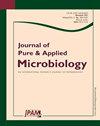Molecular Identification and Phylogenetic Analysis of Bioluminescent Bacteria Isolated from Selected Marine Crustacean in Manila Bay, Philippines
IF 0.6
Q4 MICROBIOLOGY
引用次数: 0
Abstract
Bioluminescent bacteria (BLB) are the most widely distributed light-emitting microorganisms, most of which are found as symbionts of free-living marine organisms, including the crustacean species. In this study, 4 out of 7 marine crustaceans in the northeastern section of Manila Bay were found to contain bioluminescent bacteria. Marine crustacean species namely Thenus orientalis (Oriental Slipper Lobster), Oratosquilla oratoria (Mantis Shrimp), Penaeus monodon (Giant Tiger Prawn), Litopenaeus vannamei (Whiteleg shrimp), Scylla serrata (Mud Crab), Portunus pelagicus (Blue Swimming Crab), and Charybdis feriata (Crucifix crab), were swabbed after collection. Bioluminescent bacteria were isolated from the inner surface of the carapace, eyes, abdomen, and abdominal segments of the crustacean samples. All glowing colonies were isolated and upscaled. Only bioluminescent bacteria from T. orientalis, O. oratoria, and P. monodon completed the isolation process and were identified using 16S rRNA gene sequencing for phylogenetic analysis. Furthermore, results from molecular identification through Nucleotide BLAST identified that it was Vibrio alginolyticus and Mucus bacterium. At the same time, the presence of Vibrio rumoiensis was also identified which was proved to be understudied and needs exploration. This study was aimed to identify the present bioluminescent bacteria in selected marine crustaceans in Manila Bay, Philippines through microbiological isolation, molecular identification, and phylogenetic reconstruction.菲律宾马尼拉湾海洋甲壳类生物发光细菌的分子鉴定和系统发育分析
生物发光细菌(BLB)是分布最广泛的发光微生物,大多数是自由生活的海洋生物的共生体,包括甲壳类物种。在这项研究中,马尼拉湾东北部的7种海洋甲壳类动物中有4种被发现含有生物发光细菌。采集的海洋甲壳类动物包括东方滑爪龙虾(Thenus orientalis)、螳螂虾(Oratosquilla oratoria)、巨虎对虾(Penaeus monodon)、凡纳美对虾(Litopenaeus vannamei)、泥蟹(Scylla serrata)、蓝泳蟹(Portunus pelagicus)和十字形蟹(Charybdis feriata)。从甲壳类动物的甲壳、眼睛、腹部和腹部部分的内表面分离出生物发光细菌。所有发光的菌落都是孤立的,而且规模很大。仅从T. orientalis, O. oratoria和P. monodon中分离出生物发光菌,并通过16S rRNA基因测序进行系统发育分析。通过核苷酸BLAST分子鉴定,鉴定菌株为溶藻弧菌和粘液菌。同时,还发现了鲁姆伊弧菌(Vibrio rumoiensis)的存在,但研究不足,需要进一步探索。本研究旨在通过微生物分离、分子鉴定和系统发育重建,鉴定菲律宾马尼拉湾部分海洋甲壳类动物中存在的生物发光细菌。
本文章由计算机程序翻译,如有差异,请以英文原文为准。
求助全文
约1分钟内获得全文
求助全文
来源期刊

Journal of Pure and Applied Microbiology
BIOTECHNOLOGY & APPLIED MICROBIOLOGY-MICROBIOLOGY
CiteScore
2.00
自引率
0.00%
发文量
266
审稿时长
11 months
期刊介绍:
Journal of Pure and Applied Microbiology (JPAM) is a peer-reviewed, open access international journal of microbiology aims to advance and disseminate research among scientists, academics, clinicians and microbiologists around the world. JPAM publishes high-quality research in all aspects of microbiology in both online and print form on quarterly basis.
 求助内容:
求助内容: 应助结果提醒方式:
应助结果提醒方式:


